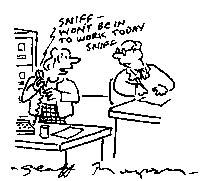This following is definitely in bad taste, isn’t it? I don’t always have a working moral compass when it comes to black humour, but I think this is just the wrong side of the line. Although I’m not sure.
A disc jockey from Revolution Radio, in Manchester, played the song ‘Jump’, by Van Halen, as police attempted to coax a suicidal woman down from a nearby motorway bridge. The DJ, Steve Penk, had been inundated by complaints from motorists held up on the road while the police went about their delicate counselling work. Penk did not mention the woman when introducing the song. Somehow the case is not helped by the fact that the woman did indeed jump, although failed to hurt herself (I don’t know how. Maybe they had put mats out).
I only became interested in the story when it was reported in the press that mental health charities were ‘horrified’ by Mr Penk’s insensitivity and started calling for all sorts of action to be taken against him. I don’t know what it had to do with them. Luckily, the owners of Revolution Radio ignored their complaints (the owners including a certain Steve Penk). It was a callous thing to do and might convince you to stop listening to his station; alternatively it might make you more inclined to listen. It might be the sort of humour which tickles you, in which case I expect the mental health charities will investigate you too.
It is not quite as bad as the recent case in China recently where a suicidal man was crouched atop a bridge being spoken to by the police when a passer-by came along, offered to help, and pushed the bloke off. Let’s all agree that’s going too far. I’m not sure what to think — truth be told I can’t get past the horror of any DJ, anywhere, playing anything by Van Halen.
More straightforward is the case of Paul Chambers, who has been banned from ever flying again, suspended from his job, interviewed by the police for seven hours and faces a court case in February — all for something he posted on the Twitter site. Worried and frustrated that his local airport was going to be shut as a consequence of bad weather when he intended to fly abroad, he twittered: ‘You’ve got a week and a bit to get your shit together, otherwise I’m blowing the airport sky high.’ The Robin Hood airport ‘takes all terrorist threats very seriously’, some buttock-clenched twit in its head office asserted. The police became involved; Chambers was banged up for the best part of a day and had his laptop, iPhone and home computer taken away from him. Then he was charged and bailed to appear before court next month, told he was banned from every airport everywhere and allegedly suspended from his job.
Now, I don’t have much time for Twitter and am always suspicious of people who use it — there is something incalculably narcissistic about it. But is there anybody stupid enough, reading that Twitter from Mr Chambers, to consider him to be a serious terrorist threat? Or a terrorist threat per se? How thick would you have to be to think such a thing? Is that what terrorists do, post warnings on Twitter, referencing the weather? Did nobody who read his Twitter — and previous Twitters, for a bit of context — not understand that he was joking and that in fact he had no intention whatsoever of blowing up the Robin Hood airport (much though he might want to do so now)?
Did the police not realise it was a joke once they’d interviewed him? And why has he been suspended from work? There’s a coming together here of several strands of grotesque officiousness, self-righteousness, self-importance and a complete and utter lack of common sense and natural justice. What Chambers did was silly, no more and no less. His punishment should be someone calling him a stupid prat and maybe slapping him once about the ears. If that.
But there are no jokes to be enjoyed anymore, certainly not using these new media which we were jubilantly assured would usher in a new democracy and connectivity. Paradoxically, this greater openness has had the consequence of empowering an infinite number of complainants and thus actually results in the restricting of freedom of speech much more than it was back in the days when the likes of Mr Chambers would have whispered to his mates, on the phone, ‘If that airport isn’t open next week, I’ll blow the bloody thing up!’
Those complainants, of course, begin with the state and the statutory authorities and continue down a long list of concerned single- issue interest groups and then conclude with a roll call of feverish and perpetually upset individuals who are apt to complain about everything they see, hear or read and demand redress. There is no room for context, no room for common sense, no sense of proportion, no accounting for nuance. What the disc jockey Steve Penk should play for Mr Chambers is Luke Haines’s baleful and clever ‘Everything You Say Will Destroy You’, with the emphasis on the word ‘everything’.
As I’ve mentioned a couple of times before in these pages, we need to come to a new consensus about how we deal with stuff on the internet; the weight we give it, whether it should be deemed public or private. To find our way between forms of discourse which are, in essence, the same as Saussure’s ideas of langue and parole; the distinction between the basic and formal ways in which we communicate. Otherwise the great opportunity of the new and instant media — its hot-headed demand for frankness and immediacy, its demotic, the notion that what you write, on Twitter or Facebook or a billion websites, is not a tablet of stone but a sudden reaction to a very specific inquiry or circumstance — will be lost. I’ve had experience of this whole business in the last week or two. But I’ve tried not to let it influence this article too much.







Comments